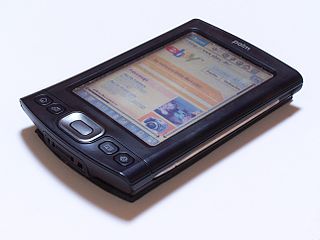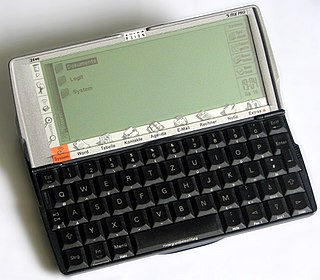Related Research Articles

A personal digital assistant (PDA) is a multi-purpose mobile device which functions as a personal information manager. Following a boom in the 1990s and 2000s, PDAs were mostly displaced by the widespread adoption of more highly capable smartphones, in particular those based on iOS and Android in the late 2000s, and thus saw a rapid decline.
Psion Organiser was the brand name of a range of pocket computers developed by the British company Psion in the 1980s. The Organiser I and Organiser II had a characteristic hard plastic sliding cover protecting a 6×6 keypad instead of a computer keyboard, with letters arranged alphabetically.

Psion PLC was a designer and manufacturer of mobile handheld computers for commercial and industrial uses. The company was headquartered in London, England, with major operations in Mississauga, Ontario, Canada, and other company offices in Europe, the United States, Asia, Latin America, and the Middle East. It was a public company listed on the London Stock Exchange and was once a constituent of the FTSE 100 Index.

Computer operating systems (OSes) provide a set of functions needed and used by most application programs on a computer, and the links needed to control and synchronize computer hardware. On the first computers, with no operating system, every program needed the full hardware specification to run correctly and perform standard tasks, and its own drivers for peripheral devices like printers and punched paper card readers. The growing complexity of hardware and application programs eventually made operating systems a necessity for everyday use.
Symbian Ltd. was a software development and licensing consortium company, known for the Symbian operating system (OS), for smartphones and some related devices. Its headquarters were in Southwark, London, England, with other offices opened in Cambridge, Sweden, Silicon Valley, Japan, India, China, South Korea, and Australia.

The S60 Platform, originally named Series 60 User Interface, is a discontinued software platform and graphical user interface for smartphones that runs on top of the Symbian operating system. It was created by Nokia based on the 'Pearl' interface from Symbian Ltd. S60 was introduced at COMDEX in November 2001 and first shipped with the Nokia 7650 smartphone; the original version was followed by three other major releases.

UIQ is a discontinued software platform based upon Symbian OS, created by UIQ Technology AB. It is a graphical user interface layer that provides additional components to the core operating system, to enable the development of feature-rich mobile phones that are open to expanded capabilities through third-party applications.

The Psion Series 5 is a personal digital assistant (PDA) from Psion. It came in two main variants, the Series 5 and the Series 5mx (1999), the latter having a faster processor, clearer liquid crystal display (LCD), and updated software. There was also a rare Series 5mx Pro, which differed only in having the operating system (OS) loaded into random-access memory (RAM) and hence upgradeable. Ericsson marketed a version of the Series 5mx renamed as MC218.
Open Programming Language (OPL) is a programming language for embedded systems and mobile devices that run the operating systems EPOC and Symbian. It was released by the British company Psion in 1984.

The Nokia 9210 Communicator is a third-generation Communicator series mobile phone produced by Nokia, announced on 21 November 2000 and released in June 2001. It greatly improved on the second-generation Nokia 9110 Communicator, providing a colour main screen and using an ARM processor. It is one of the few mobile phones able to send and receive fax.
The ITRON project was the first sub-project of the TRON project. It has formulated and defined Industrial TRON (ITRON) specification for an embedded real-time OS (RTOS) kernel.
EKA2 is the second-generation Symbian platform real-time operating system kernel, which originated in the earlier operating system EPOC.
Mark Edwards is a British businessman and the current CEO of MDS.
Android is a mobile operating system based on a modified version of the Linux kernel and other open-source software, designed primarily for touchscreen-based mobile devices such as smartphones and tablets. Android has historically been developed by a consortium of developers known as the Open Handset Alliance, but its most widely used version is primarily developed by Google. First released in 2008, Android is the world's most widely used operating system; the latest version, released on October 15, 2024, is Android 15.
A mobile operating system is an operating system used for smartphones, tablets, smartwatches, smartglasses, or other non-laptop personal mobile computing devices. While computers such as typical/mobile laptops are "mobile", the operating systems used on them are usually not considered mobile, as they were originally designed for desktop computers that historically did not have or need specific mobile features. This "fine line" distinguishing mobile and other forms has become blurred in recent years, due to the fact that newer devices have become smaller and more mobile, unlike the hardware of the past. Key notabilities blurring this line are the introduction of tablet computers, light laptops, and the hybridization of the two in 2-in-1 PCs.
The Nokia 7650 is a 2.5G consumer-oriented mobile phone belonging to the fashion and experimental (7xxx) series. It was introduced in Barcelona on 19 November 2001, and was described by CEO Jorma Ollila as the company's most important launch of that year.

Symbian was a mobile operating system (OS) and computing platform designed for smartphones. It was originally developed as a proprietary software OS for personal digital assistants in 1998 by the Symbian Ltd. consortium. Symbian OS is a descendant of Psion's EPOC, and was released exclusively on ARM processors, although an unreleased x86 port existed. Symbian was used by many major mobile phone brands, like Samsung, Motorola, Sony Ericsson, and above all by Nokia. It was also prevalent in Japan by brands including Fujitsu, Sharp and Mitsubishi. As a pioneer that established the smartphone industry, it was the most popular smartphone OS on a worldwide average until the end of 2010, at a time when smartphones were in limited use, when it was overtaken by iOS and Android. It was notably less popular in North America.
This is a list of devices that run on the Symbian platform mobile operating system, including their proprietary predecessors running on Symbian OS and EPOC.
Galileo was an unreleased 32-bit operating system that was under development by Acorn Computers as a long-term project to produce "an ultra-modern scalable, portable, multi-tasking, multi-threading, object-oriented, microkernel operating system", reportedly significant enough to Acorn's strategy to warrant a statement to the financial markets.
EPOC is a mobile operating system developed by Psion, a British company founded in 1980. It began as a 16-bit operating system (OS) for Psion's own x86-compatible devices, and was later replaced by a 32-bit system for x86 and ARM. Psion licensed the 32-bit system to other hardware makers, such as Ericsson.
References
- ↑ Orlowski, Andrew (9 November 2010). "Why Symbian failed: developers, developers, developers". The Register . Retrieved 15 January 2025.
- 1 2 Sales, Jane (December 2005). Symbian OS Internals: Real-time Kernel Programming. Wiley. pp. 2, 13. ISBN 978-0-470-02525-3.
- 1 2 3 Morris, Ben (2007). The Symbian OS Architecture Sourcebook: Design and Evolution of a Mobile Phone OS (PDF). John Wiley & Sons. pp. 18, 22, 25, 259, 284, 291. ISBN 978-0-470-01846-0 . Retrieved 15 January 2025.
- ↑ "Business: The Company File Mobile giants team up against Microsoft". BBC News . 24 June 1998. Retrieved 15 January 2025.
- ↑ Orlowski, Andrew (29 November 2010). "Symbian's Secret History: The battle for the company's soul". The Register . Retrieved 15 January 2025.
- ↑ Chan, Karen (19 February 2001). "Siemens License Deal Gives Symbian World's Top Five Handset Makers" . Wall Street Journal . Archived from the original on 2 October 2024. Retrieved 15 January 2025.